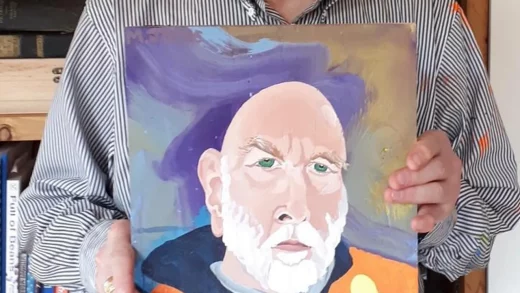:format(webp)/https://www.thestar.com/content/dam/thestar/entertainment/stage/review/2023/06/19/stratford-2023-brad-frasers-adaptation-of-richard-ii-is-as-expert-as-it-is-provocative/stephen_jackman_torkoff_and_emilio_vieira_in_richard_ii.jpg)
This updated Shakespeare tragedy is a wild, decadent ride.
Director Jillian Keiley has reset the story of a late 14th-century king of England in the disco era, complete with a dancing chorus of leather-clad angels, a shirtless wrestling match in place of a duel and queer sex in a hot tub.
Shakespeare purists and the socially conservative are unlikely to boogie in this wonderland. They’ll be missing out, though: Brad Fraser’s adaptation is as expert as it is provocative and Keiley’s staging is electric, full of striking set pieces amongst pacy scenes.
Leading a terrific cast, Stephen Jackman-Torkoff gives an electrifying performance as the self-indulgent, non-stop charismatic Richard, who is tragically ill-suited for his role as monarch.
Following Shakespeare’s plotting closely, the play charts Richard’s downfall as he loses control of his kingdom to his cousin and rival Henry Bolingbroke, later King Henry IV (Jordin Hall) and is betrayed by many close to him. Richard understands himself as chosen by God, so his deposition has seismic effects, a move to human-led politics and power grabs.
Keiley invited Fraser to adapt the play after reading his autobiography “All the Rage,” in which Fraser chronicles his experiences as an emerging playwright and proudly out queer man revelling in the decadence of the pre-AIDS 1970s and ’80s. That time of buoyant sexual liberation and social change maps well to Richard’s story.
The program notes tell us that the action is set in New York City during the ’70s and ’80s, and this is reflected in decor, costumes and lights. The text remains in the historical place and time, in late 14th century-England, and the language remains Shakespearean with edits and additions by Fraser that were, in my experience, imperceptible (I couldn’t tell where Shakespeare ended and Fraser began). This mingling of time and place enhances the production’s queerness: it’s a both/and, not an either/or.
The action starts with a big dance scene and Richard is the life of the party: gyrating, snorting cocaine, showboating (the excellent club-style choreography is by Cameron Carver, with original music by Rhapsodius). Costume designer Bretta Gerecke dresses Jackman-Torkoff’s Richard all in white, reflecting the character’s self-perception as divine and untouchable. Richard’s outfits feature platform boots, beribboned see-through trousers over trunks, and tank tops, with his emblem, the white stag, slung over his crotch like a G-string. It’s all topped off by an ostentatiously large crown.
This emphasis on appearance complements Jackman-Torkoff’s approach to the character, which foregrounds physicality. Slender yet toned and very tall, Jackman-Torkoff feels and acts this Richard through their whole body, complementing line readings with an extravagant arm gesture or insouciant turn of the head. When Richard returns from Ireland after an ill-advised military action, he lies on and sensuously caresses the ground, one in any number of brilliantly chosen gestures that communicates the character’s self-understanding. As the divinely chosen king, Richard is England, he is the land and, therefore, in that scene he’s making love to himself.
He also makes love to others. Following cues in Shakespeare’s text, the production has Richard affectionately married to Queen Isabel (Hannah Wigglesworth) and in a passionate sexual relationship with his cousin Aumerle (Emilio Vieira). That relationship blossoms in a sex club scene in which a hot tub is suggested by wheeling mirrored, coffin-shaped set pieces into a square and pulling strips of opaque rubbery fabric over them, with steam rising up (scenic design by Michael Gianfrancesco). A few of the chorus — a representation of Richard’s self-perception as divine, the angels rather than devils on his shoulders — rest their arms and heads languorously on the tub edge.
Aumerle’s disdainful account of seeing Bolingbroke off to his banishment is here a form of seduction, with Richard and Aumerle accurately referring to each other and Bolingbroke as “cousin” in a way that relishes the incestuous kink. The erotic interplay between the pair is expertly handled (intimacy direction by Aria Evans).
Vieira’s Aumerle travels a mighty character arc and his playing is superb, from confident, strutting consort to a trembling, compromised mess. Hall’s focus is razor-sharp as Bolingbroke, holding onto his principles even as he’s challenged by the change around him. Michael Spencer-Davis, Sarah Orenstein, John Wamsley and Andrew Robinson are standouts in secondary roles, but to single them out I do not intend to detract from all the performances, which are sterling.
Keiley’s direction is unabashedly high-concept, as when a brutal battle is represented by Hotspur (Thomas Duplessie) banging a baseball bat on a target and the angels dropping violently in harsh spotlights (lighting design by Leigh Ann Vardy).
At times I found myself wondering if all the physical flourishes were too much — as with the repeated use of the rubbery strips to represent struggles with mortality, and Richard’s return from Ireland signalled by chorus members twirling illuminated batons in the air like helicopter wings, accompanied by Don Ellis’s sound design.
But this is a story of excess and its perils, and Keiley and company have rightly gone all in. Fraser has added a subplot to suggest parallels with the AIDS crisis: the courtier Willoughby (Charlie Gallant) has an unknown disease and his friend Ross (Matthew Kabwe) must decide whether to support or even touch him.
What seals the deal is how elegantly the company speak the verse, which contains some of Shakespeare’s most beautiful passages. In keeping with the show’s overall tenor, we get the famous “death of kings” speech not once but twice, within the story and as epilogue.
In a program note, assistant director Kwaku Okyere underlines the subversiveness of representing Richard as Black and queer, and expresses the company’s hope that their show will advance conversations about representation and power. I’m here for it: this production puts the Stratford Festival’s considerable reputation and resources in service of challenging and renewing Shakespeare’s relevance.
Correction — June 19, 2023: This story has been updated to correct the name of actor John Wamsley.
Richard II
By William Shakespeare, adapted by Brad Fraser, conceived and directed by Jillian Keiley. Until Sept. 28 at the Tom Patterson Theatre, 111 Lakeside Dr., Stratford. Stratfest.com or 1-800-567-1600
JOIN THE CONVERSATION
does not endorse these opinions.



